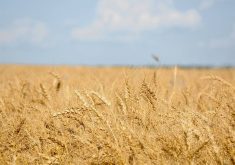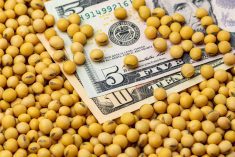MarketsFarm — While corn and wheat prices on the Chicago Board of Trade (CBOT) stayed fairly steady during the week ended Wednesday, soybean prices steadily declined.
The November soybean contract dropped 30 cents per bushel from one week ago to close Wednesday at $13.1975/bu. (all figures US$). During the same week, December corn only lost 0.75 of a cent at $4.815/bu. December Chicago wheat went down 7.5 cents to $5.8875/bu., while the December Kansas City hard red wheat contract declined 15.75 cents to $7.29/bu. and December Minneapolis spring wheat lost 2.75 cents, to $7.8475/bu.
Read Also
Farmers expected to boost canola area beyond Statistics Canada intentions report
Canadian farmers might plant more canola acres than the 21.8 million that Statistics Canada reported in its seeding intentions report released on Thursday morning, analysts told Reuters.
Scott Capinegro, a Barrington, Ill.-based strategist for AgMarket.Net, said recent price movement was less affected by ongoing harvesting operations and more to do with the funds.
“Position-wise, funds were short corn, short wheat and long soybeans,” he said. “So you’ve seen a lot of those spreads over the last seven to 10 days turning or moving around.”
While the 100-day moving average for the November soybean contract is $13.05/bu., Capinegro thinks there’s not much room on the downside.
“(Soybeans are) the crop where we don’t have a lot of room to lower those yields. The carryout here is going to get very tight,” he said.
Harvest progress is “starting to pick up” across the U.S., according to Capinegro. However, substantial rainfall from Montana to Arkansas in the coming week with higher concentrations in Oklahoma and Kansas, will likely delay combining.
Capinegro doesn’t think this will affect prices.
“It’s just going to slow down the harvest. In northern Illinois, we’re not really started yet,” he said. “For the lack of any news, when we’re a little bit higher, they can say ‘harvest delays.'”
The U.S. Federal Reserve’s announcement on Wednesday that it is keeping its key interest rates unchanged did little to affect the CBOT. Rather, Capinegro is worried about the potential for a U.S. government shutdown at the end of September unless Congress passes new spending bills.
“What if we close down the government? We have the possibility of not seeing a November world agricultural supply/demand estimates (WASDE) report,” he said. “You won’t be done harvest (by then), but you would get more numbers to adjust.”
In the short term, Capinegro doesn’t expect too much price movement.
“Unless China decides to start coming in, but I think everybody’s in a waiting game right now,” he said.
— Adam Peleshaty reports for MarketsFarm from Stonewall, Man.















